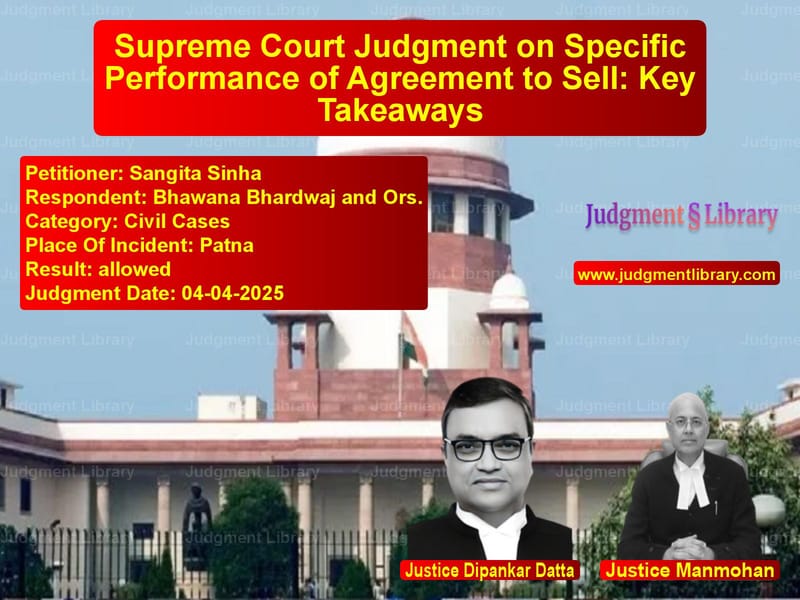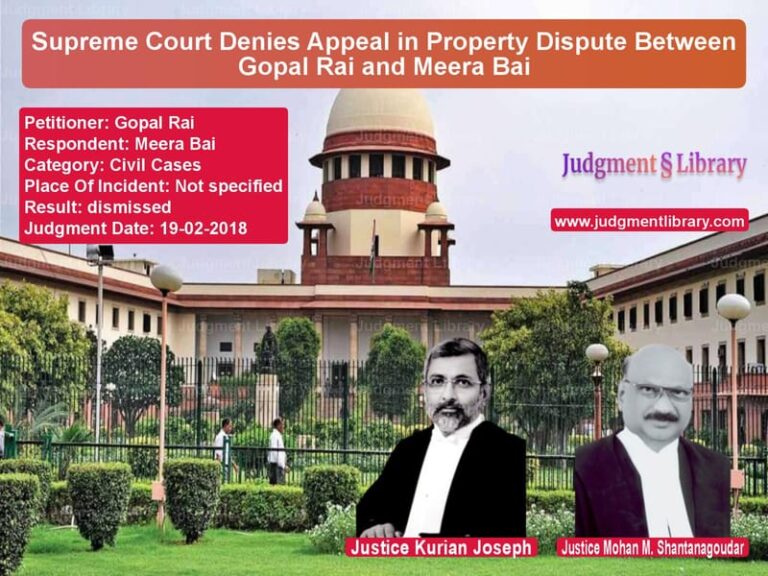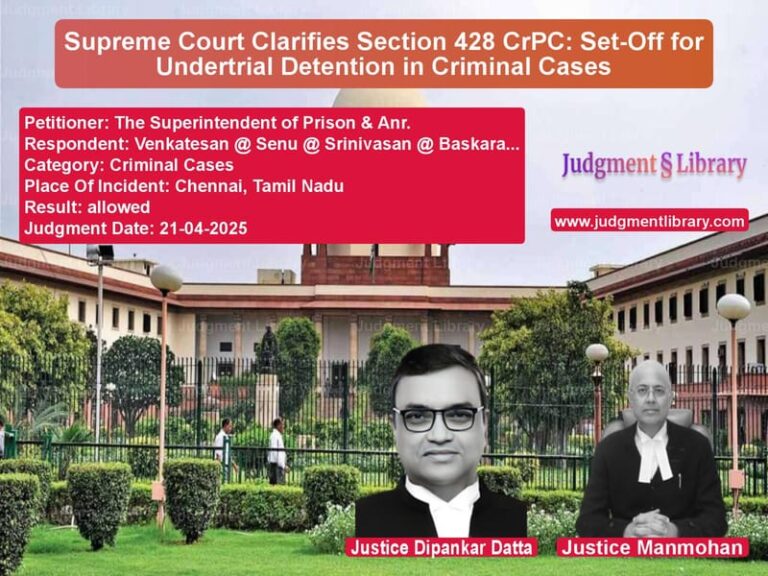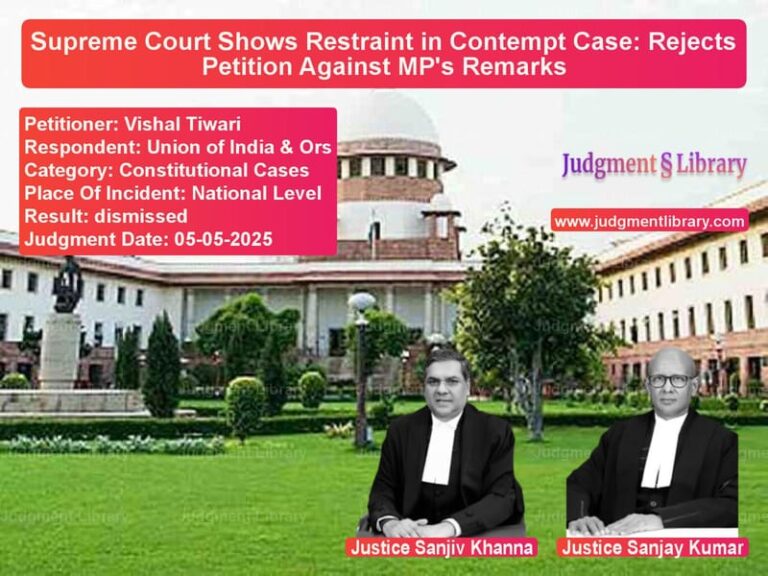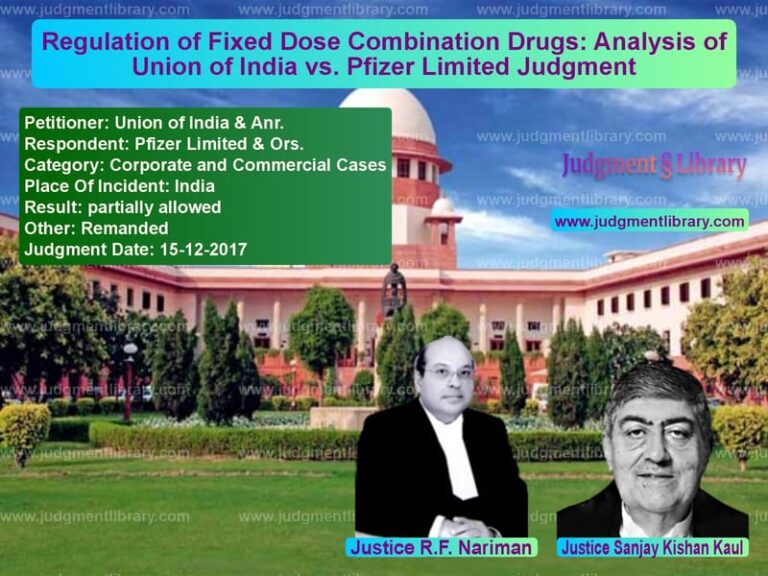Supreme Court Judgment on Specific Performance of Agreement to Sell: Key Takeaways
The Supreme Court of India recently delivered a significant judgment in the case of Sangita Sinha vs. Bhawana Bhardwaj and Ors., addressing the critical issue of whether a suit for specific performance of an Agreement to Sell can be decreed if the buyer has accepted the refund of the majority of the earnest money during the pendency of the civil suit. The judgment, authored by Justices Dipankar Datta and Manmohan, provides a detailed analysis of the principles governing specific performance under the Specific Relief Act, 1963.
Background of the Case
The dispute arose from an unregistered Agreement to Sell dated 25th January 2008, executed between the original defendant, Late Kushum Kumari (the seller), and Respondent No. 1, Bhawana Bhardwaj (the buyer). The total sale consideration for the property was Rs. 25,00,000/-, with the buyer paying Rs. 2,51,000/- in cash and issuing three post-dated cheques worth Rs. 7,50,000/-. The buyer alleged that the seller failed to execute the sale deed, leading to the filing of a suit for specific performance.
Key Submissions
Appellant’s Arguments
The appellant, Sangita Sinha, contended that the Agreement to Sell was fraudulently obtained, as the seller’s signatures were taken on blank papers under the pretext of executing a Will. The appellant highlighted that the seller had canceled the agreement and refunded Rs. 2,11,000/- through demand drafts, which the buyer encashed without protest. The appellant argued that this act amounted to acceptance of the agreement’s cancellation, rendering the suit for specific performance untenable.
“He submitted that the encashment of the demand drafts amounted to revocation of the Agreement to Sell dated 25th January 2008. He contended that the subject suit was filed by the Respondent No.1-buyer after revocation of the Agreement to Sell dated 25th January 2008, without seeking any relief against the revocation and without disclosing that she was in receipt of the demand drafts and post-dated cheques.”
Respondent’s Arguments
Respondent No. 1, Bhawana Bhardwaj, argued that the Agreement to Sell could not be unilaterally canceled by the seller. She emphasized that the buyer had paid the balance sale consideration and was ready and willing to perform her part of the contract. The respondent also challenged the appellant’s locus standi, claiming she had no right, title, or interest in the property.
“He contended that as the balance sale consideration had been paid subsequently, the cancellation of the Agreement to Sell dated 25th January 2008 was not valid.”
Court’s Reasoning
Readiness and Willingness
The Court emphasized that continuous readiness and willingness on the part of the buyer are essential for granting specific performance. It noted that the buyer’s encashment of the demand drafts demonstrated her unwillingness to proceed with the agreement.
“Continuous readiness and willingness on the part of the Respondent No.1-buyer /purchaser from the date of execution of Agreement to Sell till the date of the decree, is a condition precedent for grant of relief of specific performance.”
Cancellation of Agreement
The Court held that the buyer’s acceptance of the refunded amount led to the cancellation of the agreement. It ruled that the buyer’s failure to seek a declaratory relief against the cancellation rendered the suit for specific performance non-maintainable.
“This Court is also of the view that the act of the Respondent No.1-buyer in encashing the demand drafts leads to an irresistible conclusion that the agreement in question stood cancelled.”
Suppression of Material Facts
The Court criticized the buyer for suppressing material facts, such as the receipt of the cancellation letter and demand drafts, which disentitled her from claiming discretionary relief.
“The failure of the Respondent No. 1-buyer to disclose the same in her plaint amounts to suppression of material fact, disentitling her from the discretionary relief of specific performance.”
Conclusion
The Supreme Court allowed the appeal, setting aside the judgments and decrees passed by the lower courts. It declared the sale deed executed in favor of the buyer as null and void and directed the appellant to refund the balance sale consideration of Rs. 24,61,000/-.
This judgment underscores the importance of transparency and continuous readiness and willingness in suits for specific performance. It also highlights the consequences of suppressing material facts and the necessity of seeking appropriate declaratory reliefs in such disputes.
Petitioner Name: Sangita Sinha.Respondent Name: Bhawana Bhardwaj and Ors..Judgment By: Justice Dipankar Datta, Justice Manmohan.Place Of Incident: Patna.Judgment Date: 04-04-2025.Result: allowed.
Don’t miss out on the full details! Download the complete judgment in PDF format below and gain valuable insights instantly!
Download Judgment: sangita-sinha-vs-bhawana-bhardwaj-and-supreme-court-of-india-judgment-dated-04-04-2025.pdf
Directly Download Judgment: Directly download this Judgment
See all petitions in Property Disputes
See all petitions in Specific Performance
See all petitions in Contract Disputes
See all petitions in Succession and Wills
See all petitions in Damages and Compensation
See all petitions in Judgment by Dipankar Datta
See all petitions in Judgment by Manmohan
See all petitions in allowed
See all petitions in supreme court of India judgments April 2025
See all petitions in 2025 judgments
See all posts in Civil Cases Category
See all allowed petitions in Civil Cases Category
See all Dismissed petitions in Civil Cases Category
See all partially allowed petitions in Civil Cases Category

